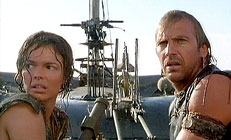|
|
|
|
Waterworld
|
 |
|
"Before Ishtar [1987], I never realised there was this desire to kill a film." Thus reflected Dustin Hoffman on the "sobering" experience of watching the media trash a film before it had even been released publicly – and, in some cases, trashed by industry pundits who had not seen the film themselves. Now Waterworld, from co-producer and star Kevin Costner and director Kevin Reynolds, joins Ishtar, Heaven's Gate (1980) and Hudson Hawk (1991) on the growing list of unfairly trashed movies. This bad press in part arises from the matter of money – yes, it is an unbelievably expensive film. But did high budgets stop most reviewers from eulogising Terminator 2 (1991) or Speed (1994) as terrific entertainments? Beyond its price, Costner and Reynolds have had to fight another ugly, irrational rumour about Waterworld: that it is a sprawling mess, out of control, a total artistic failure – or, in industry parlance, a turkey. The American media's turkey-talk invariably carries a devastating radiation effect. If enough pundits declare that, for instance, Color of Night (1994) is a turkey, you can bet a sadly high percentage of reviewers all over the world will parrot the same idiocy as if hypnotised. So critics and audiences alike have been well primed to look out for what's bad in Waterworld. Already we are hearing that the film has separate streams of action and comedy that never quite join up – a statement that could serve as a neutral description of most contemporary spectaculars. We hear that it rips off the Mad Max films – as if large-scale borrowing and recycling were not defining aspects of every popular genre in cinema. The fact is that Waterworld is a fine film – exciting, poetic, thoughtful, spectacular and beautifully crafted. Reynolds has managed what few action directors can – to retain the epic scope of the set-piece scenes while making every small move within them perfectly legible to the viewer. The central premise of this futuristic epic – an entire, divided civilisation perched precariously on water – never loses its interest. Sets such as Costner's ingeniously rigged boat and the chaotic, communal outposts are masterpieces of canny art direction. The action side of the plot pits Mariner (Costner), a mutation of man and fish, against Deacon (Dennis Hopper), a wisecracking, power-mad psycho, in a race to find the "Dryland" of myth. By my estimation Hopper can go on playing such parts for another twenty-five years at least – and I hope he does, because he has honed his lunatic act into a fine and delightful art. Waterworld may owe a lot to the Mad Max series, but in one respect it extends a theme that remains only latent in George Miller's modern classics. Mariner is a loner, an outcast, who finds himself drawn into bonds of love with a woman (Jeanne Tripplehorn) and a child (Tina Majorino from Corrina, Corrina [1994]). Fleetingly, the three form a family – but a very modern family, defined not by blood ties but shared, life-and-death experience. On the water, this makeshift family pulls together. But on Dryland? For that knowledge, you'll just have to ignore the killing hype and go check out Waterworld for yourself. © Adrian Martin September 1995 |
![]()